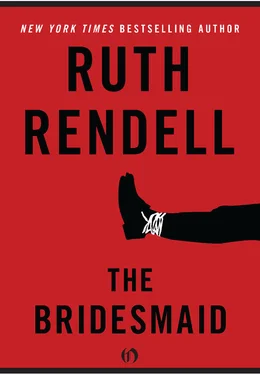Ruth Rendell - The Bridesmaid
Здесь есть возможность читать онлайн «Ruth Rendell - The Bridesmaid» весь текст электронной книги совершенно бесплатно (целиком полную версию без сокращений). В некоторых случаях можно слушать аудио, скачать через торрент в формате fb2 и присутствует краткое содержание. Год выпуска: 2010, Издательство: Open Road Integrated Media LLC, Жанр: Триллер, на английском языке. Описание произведения, (предисловие) а так же отзывы посетителей доступны на портале библиотеки ЛибКат.
- Название:The Bridesmaid
- Автор:
- Издательство:Open Road Integrated Media LLC
- Жанр:
- Год:2010
- ISBN:нет данных
- Рейтинг книги:3 / 5. Голосов: 1
-
Избранное:Добавить в избранное
- Отзывы:
-
Ваша оценка:
- 60
- 1
- 2
- 3
- 4
- 5
The Bridesmaid: краткое содержание, описание и аннотация
Предлагаем к чтению аннотацию, описание, краткое содержание или предисловие (зависит от того, что написал сам автор книги «The Bridesmaid»). Если вы не нашли необходимую информацию о книге — напишите в комментариях, мы постараемся отыскать её.
The Bridesmaid — читать онлайн бесплатно полную книгу (весь текст) целиком
Ниже представлен текст книги, разбитый по страницам. Система сохранения места последней прочитанной страницы, позволяет с удобством читать онлайн бесплатно книгу «The Bridesmaid», без необходимости каждый раз заново искать на чём Вы остановились. Поставьте закладку, и сможете в любой момент перейти на страницу, на которой закончили чтение.
Интервал:
Закладка:
“Not by name, mark you,” said Roy. “‘The terribly sweet dishy boy with the fair curly hair’ was what she said. Oh, chase me, Charlie, I should be so lucky.”
“What did she want?”
“Are you asking me? At your age you ought to know. I expect she’ll show you if you pop up to Highgate when the sun’s over the yardarm.”
Philip said patiently, “What did she say she wanted?”
“In words of a few simple syllables, can she have you to keep an eye on things when the fitters start. Not me or some other bloke less easy on the eye is what the little darling means.”
It was rare for Philip to involve himself in the crush that filled the pubs and cafes of this part of inner London at lunchtime. He usually stopped somewhere in a suburb on his way to a client call. But today, as a result of having had no breakfast, he was very hungry. Before starting on the long drive to Croydon, he needed something solid inside him, a couple of hamburgers or a plate of sausages and chips. Two towel rails in cardboard crates, replacements for a damaged pair, were needed in Croydon. He might as well take them with him in the boot of the car.
This was an area of office blocks. Passages and alleys led between them into car parks and warehouses. Only one old street remained, much as it had always been, a relic of a Georgian terrace with three little shops tacked on to the end of it. The shops themselves were not old-fashioned but modern tourist traps aimed at those who might conceivably pass along here on their way to Baker Street station. Returning from the car park, making for a cafe where he thought the worst of the rush would now be over, Philip came out of the passages under an arch into the old street, which seemed to go from nowhere to nowhere.
He had often been this way before but had never previously even glanced at the shops. It would have been impossible for him to say what wares were displayed in their windows. But now the gleam of red and blue glass attracted his attention, and he paused to look at the glasses and jugs and vases ranged on the shelves.
Most of it was Venetian glass. In the very front were pairs of glass earrings and strings of glass beads, behind these glass animals, galloping horses and dancing dogs and long-necked cats. But what made him stare almost incredulously—what had perhaps, unknown to his conscious mind, originally caught his eye—was a glass dagger.
It was displayed on the left-hand side of the window and was contained, for safety’s sake or out of prudence or possibly because the law required it, in a case not of glass but of some kind of glasslike plastic. The glass of which it was made was translucent, lightly frosted. Its blade was some ten inches long, the cross-piece of the handle three inches wide. Philip stared at it, incredulously at first, then with a kind of sick recognition. How could it be that he had never heard of the existence of daggers made of glass until five days before but in the time since, he had heard persistent talk of the things and now had actually seen one in a shop window?
It was like the word you read in the paper that you’ve never heard before, he thought, and the same day someone speaks it to you and you read it in a book. These things couldn’t be rationally accounted for. It couldn’t be merely that you actually had seen the word many times before (known about glass daggers subconsciously for years) and that it was only some emotive force which now brought it sharply to your attention. Something occult must be at work, some force as yet beyond human knowledge. Senta would account for it like that, and who could say she was wrong? Worse for him than the coincidence was the discovery that glass daggers actually existed. Senta hadn’t lied. She hadn’t lied about her mother being Icelandic and dying in childbirth, or about going to drama school. Had he ever caught her out in a real lie?
That was a thought too appalling to linger over—that her lies might exist only in his imagination. He went into the shop. A girl came up to him and, with a slight foreign accent, Italian perhaps, asked if she could help him.
“The glass dagger in the window,” he said, “where does it come from?”
“Murano. It’s Venetian glass. All our glass is Venetian, made on Murano.”
That was the name Senta had told him. He had been trying to remember it. “Isn’t it rather dangerous?”
He hadn’t meant to sound accusing, but she was at once on the defensive. “You couldn’t hurt yourself with it. It is quite—what do you call it?—blunt. The glass is smooth—here, let me show you.”
She had dozens of the things in a drawer, all in Perspex cases. It was an effort for him to bring himself to touch it. He felt sweat break out on his upper lip. His finger just touched the edge of the blade. It was quite smooth. The tip ended in a small blob or bubble of glass.
“What’s the point,” he said, almost as if she wasn’t there, as if he were talking to himself, “of a knife that won’t cut?”
Her shoulders lifted. She said nothing, just looked at him in a way which was growing suspicious. He didn’t ask the price but handed the box and knife back to her and left the shop. The answer to his question was simple enough—the glass would be ground, a not much harder task than sharpening metal. By now he thought he was beginning to understand Senta’s way of mixing truth and fantasy. She might have bought the daggers but not in Venice. She could have bought them here in London.
He turned almost blindly out of the old street. No buses ran along here and there were no shops, only the rears of more office blocks. In front of an almost windowless concrete wall, four storeys high, an area of car parking with a notice at the gate announcing that it was strictly reserved to the use of employees of the company who occupied the block.
A car had just turned in. Because it was a black Jaguar, it caught Philip’s attention, having the effect of just distracting him from these painful and terrifying ideas. Half-bemused, he watched, the car move into the one vacant space and park there. The door opened and the driver got out.
It was Gerard Arnham.
CHAPTER FOURTEEN
In the past his feelings had alternated between never wanting to see Arnham again and wanting to see him in order to have the whole thing out, and had finally faded into indifference. But he had for a long time been conscious of the fact that he might bump into Arnham on any occasion he went to head office. That, as much as the crowds, had made him avoid having lunch in any of the local eating places. Now he couldn’t imagine anyone he would rather have seen. It was nearly as wonderful as being reunited with someone you loved after a separation. Philip could hardly restrain himself from shouting out an excited greeting to Arnham as the man came walking from the car park.
Arnham, seeing Philip some few seconds after Philip had seen him, hesitated on the opposite pavement. It was as if he were abashed. But he must almost immediately have sensed Philip’s delight, for a smile, slowly dawning on his face, spread and widened as he raised one hand in a salute and, having allowed a couple of cars to pass, hastened across the street.
Philip advanced towards him with outstretched hand. “How are you? It’s good to see you.”
Afterwards, when some of the euphoria was passed, he thought how astonished Arnham must have been by this fulsome greeting. After all, he had only met Philip once before, hadn’t treated him and his sisters very warmly, and had unmercifully thrown Philip’s mother over. Perhaps the truth was he just felt relieved at Philip’s ability to let bygones be bygones or else thought him insensitive. Whatever his feelings, he didn’t show them but shook hands heartily and asked Philip how life was treating him.
Читать дальшеИнтервал:
Закладка:
Похожие книги на «The Bridesmaid»
Представляем Вашему вниманию похожие книги на «The Bridesmaid» списком для выбора. Мы отобрали схожую по названию и смыслу литературу в надежде предоставить читателям больше вариантов отыскать новые, интересные, ещё непрочитанные произведения.
Обсуждение, отзывы о книге «The Bridesmaid» и просто собственные мнения читателей. Оставьте ваши комментарии, напишите, что Вы думаете о произведении, его смысле или главных героях. Укажите что конкретно понравилось, а что нет, и почему Вы так считаете.











